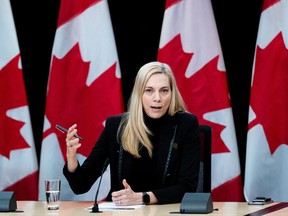St-Onge argued that Canadians need a remedy to combat the misinformation on social media

OTTAWA — The Liberals want Canadians to pay more for their public broadcaster, saying the country’s “national security” depends on it.
Recommended Videos
The 17-page document details how the Liberals want to transform the CBC’s funding model and governance by nearly doubling the amount of money Canadians spend each year and removing advertising from news programming.
“Public finances are a matter of concern for the Canadian population, but so are our national security and our sovereignty,” said St-Onge who also confirmed she would not be running in the next federal election, for family reasons.
She said the proposal should be part of a package of measures put in place to protect Canada from foreign interference, from threats from the “Trump administration” and from “the hegemony and the place that the richest men on the planet occupy in the public space of discussion, debate and information.”
She repeatedly attacked the “tech oligarchs” in the United States, often referred to as the CEOs of Google, Meta, Amazon and Tesla, for their proximity and influence with the president of the United States.
St-Onge argued that Canadians need a remedy to combat the misinformation that often circulates on social media.
“So this is an investment in the sovereignty of our country, in the security of our country and also in the economic viability of our country,” St-Onge said.
The timing of the announcement raised eyebrows, with the minister soon stepping down, her party selecting a new leader on March 9, and the likelihood that Canadians will go to the polls this spring.
St-Onge said Conservative obstruction in the House of Commons prevented her from delivering her plan for the CBC in the fall. But with Parliament now prorogued, the minister’s announcement was not a new bill, but a road map. In fact, she didn’t say whether legislation to implement the new changes was ready to be introduced once the House reconvenes.
During her press conference, the minister said she wanted this new model to “take politics out of the CBC,” but then attacked the Conservatives for their intention to defund it.
“You cannot say that you love Canada and yet pledge to destroy our public broadcaster that is central in telling the stories of our country,” she said.
“Pierre Poilievre doesn’t know what it means to put Canada first, or else, he would choose to protect Canadian institutions that belong to Canadians and exist for Canadians,” she added.
Poilievre didn’t wait long to criticize the minister’s “road map” as he was himself having a press conference in Toronto during the minister’s speech.
“Almost nobody watches CBC Television. They have among the worst ratings of any network and yet Trudeau gives them billions more. We’re going to cut wasteful spending, not just there, but across the government, to bring down inflation, deficits and taxes, that’s common sense,” he said.
The minister did not specify, however, the exact amount the federal government would add to the CBC’s budget. Currently, Ottawa spends about $1.38 billion on its public broadcaster, which works out to an average of $33.66 per person. The minister’s goal is to bring Canada, which now ranks sixth among G7 countries in spending on its public broadcaster, closer to the $62.20 average.
The government also wants CBC to stop charging subscription fees for its digital services, such as CBC Gem.
“We are pleased to see steps forward in this direction and to see that subscription fees will be eliminated in this new mandate; this was one of our first requests, in order to ensure that the content produced is accessible to all,” said Bloc Québécois heritage critic Martin Champoux.
The Liberals also want to change the way CBC is funded, moving from parliamentary appropriations, which are the federal government’s general budget, to statutory appropriations, which are set out in an act of Parliament that is not voted on annually by Parliament. The funding level based on a per capita formula would provide “greater certainty,” according to the government.
With increased public funding, CBC would be prohibited from broadcasting advertising during its news, information and public affairs programs on all of its services.
This is a long-standing request from private media outlets, which criticize Radio-Canada for raking in hundreds of millions of dollars in advertising revenue. CBC/Radio-Canada’s revenues amounted to $213 million and Radio-Canada’s to $214 million.
In fact, news publishers “wholeheartedly” welcomed the minister’s proposal.
“We have been making the case for years that private sector publishers shouldn’t be competing with the CBC for scarce advertising dollars,” said Paul Deegan, the president and chief executive officer of News Media Canada.
Our website is the place for the latest breaking news, exclusive scoops, longreads and provocative commentary. Please bookmark nationalpost.com and sign up for our newsletters here.